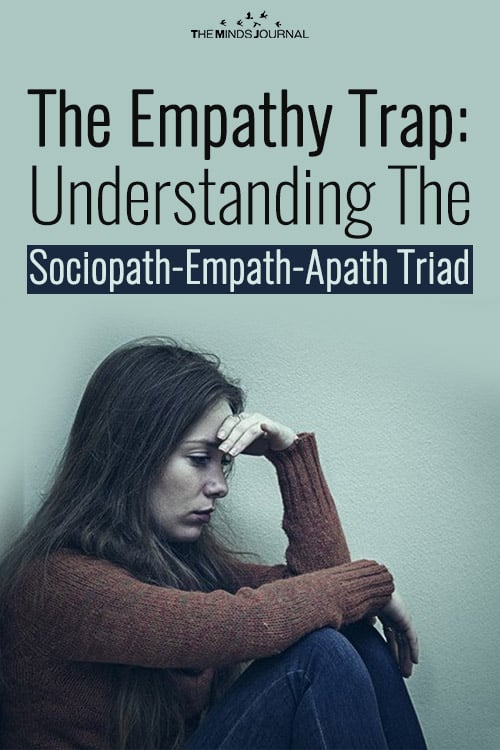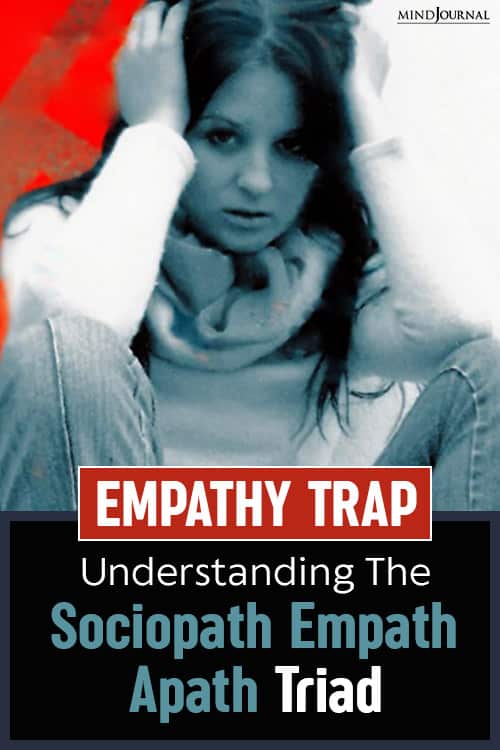When it comes to being an empath, it is common knowledge that they are the most desirable targets of sociopaths. Sociopaths are always on the lookout for them because they know how much they can condition them and take advantage of their empathy and kindness, for fulfilling their own selfish needs. When sociopaths, once they are done, discard empaths like garbage, the latter falls into the Empathy Trap.
People fall into the Empathy Trap when after getting targeted, exploited, and discarded by a sociopath, they try to deal with the trauma by holding themselves responsible for everything that happened to them. Self-deprecation and self-doubt plague them every step of the way, and they constantly think that all the toxic and heartbreaking things that happened to them, happened because they let them happen.
But that’s the thing about toxic people, especially sociopaths. They know exactly what to say and what to do, in order to make you believe what they want you to believe. They are the real culprits, but they will manipulate you in such a way, that you will start to think you are the culprit, not them.
When they come across someone, the first thing they do is analyze them very carefully and try to see just how much empathy they have. If they realize that they are interacting with an empath, then it’s just a matter of time before they start planning about how to exploit them and their kindness.
Empathic people are mostly the natural targets of sociopaths, but empaths with a low level of empathy are usually ignored. However, they are kept on the sidelines so that the sociopaths can use and exploit them when they need something different and someone else to torment, other than the prime empath.
Related: Emotional Abuse and Sociopaths
The psychological and emotional trauma left behind by a sociopath is not always visible to the human eye, but it’s there beneath the surface, always threatening to rear its ugly head when they least expect it, or when they feel that they have finally got everything under control. The trauma caused by sociopaths can lead to post-traumatic stress disorder (PTSD), depression, and anxiety disorders.
Empaths who have been abused and harassed by sociopaths for a very long time, end up being chronically traumatized and exhibit signs of hyper-anxious and hyper-vigilant behavior, stomach pain, nausea, tremors, back pain, frequent headaches and migraines, and gastrointestinal issues.
Empathy Trap: Sociopath-Empath-Apath Triad
When it comes to abusing others, especially empaths, sociopaths don’t always do all the dirty work themselves; they enlist the help of certain people who they know will do a good job in tormenting others. These certain people are apaths. Just like narcissists have flying monkeys to do their dirty jobs, and further their toxic causes, sociopaths have apaths for the same.
Sociopath
Sociopaths are smarter than the average person, which is why they can very easily manipulate and emotionally wreck other people without letting their true nature come to the forefront. Superficial is their middle name, and they use their superficial charm to divert attention from their toxic nature.
Sociopaths start to target people from a very young age, and exploiting people’s goodwill, trust, kindness, and credibility are what they do best. They can go to any lengths to get their needs met and don’t care how badly and horrifically they hurt someone. All they care about is themselves, and what they want from people, and they don’t stop until they get it.
Sociopaths will manipulate empaths and torment them with their toxicity, and the sad part is, the latter won’t even realize what’s happening to them until it’s too late. Gaslighting, displacement of responsibility, moral justification, and distortion of consequences are just some of the many horrible things these toxic people do to their victims, to keep them in their control.
They only care about themselves, their self-interests, needs, and desires, and they will do anything to get it. Targeting empaths is the best choice for them because they know they can take advantage of an empath’s purity and niceness.
Want to know more about sociopathy? Check this video out below!
Apath
People who are indifferent towards others’ pain, and don’t feel even a little bit of compassion and sadness for them, especially the targeted people, are known as apaths. They are always ready to do the sociopath’s bidding, and whatever they are asked to do. They are blind to their master’s toxicity and evilness, and simply exist to serve their needs, and do their dirty work.
And that is why apaths are a central weapon in the sociopath’s arsenal who plays a huge part in their sociopathic abuse and the consequent trauma. Sociopaths have a keen eye and smart mind to understand who will blindly follow them and do what they are expected to, without asking too many questions.
Now apaths can are not always as bad and toxic as a sociopath because they do have some positive and redeeming qualities in themselves, so why they get involved with a sociopath, might not be that hard to understand, but it’s definitely very hard to accept. The main reason is their lack of insight and strong morals, resulting in questionable judgment and blind devotion towards the sociopath. Another potential reason might be that they hate the target, or are jealous of them, and that’s why they go all out to make their lives a living hell.
Another very important factor is that maybe the sociopath has brainwashed the apath to such an extent, that they refuse to see the real face of the sociopath and keep on believing that what they are doing is the right thing. Or they might feel that their life is too complicated as it is, so they don’t have the energy nor the moral courage to help the target.
Be it passive or active involvement, the apath’s morals, ethics, and consciences tend to take a backseat, and this leads them to follow their sociopathic master blindly.
At the bottom of it all is fear. Apaths are inherently fearful and cowardly people, who only like to look out for themselves and their own interests. They will agree with anything and everything the sociopath does, just to stay in their good books, and to stay safe. Their learned helplessness pushes them to do the sociopath’s dirty work because under no circumstances do they want to suffer the consequences of the sociopath turning their hateful lenses on them.
Apathy is basically an avoidance and survival strategy, and one which keeps them on safer waters.
Related: How Abusive People View Abuse – Apaths, Egocentrics, Narcissists, Sociopaths, Psychopaths
Empath
A sociopath’s primary target is always an empath because they are simple, good-hearted people who are highly intuitive and perceptive and have a lot of love and compassion to give. They are emotionally intelligent beings who can always sense when something is wrong because they always follow their gut instinct and know the power of it.
In other words, empaths have the ability to understand their emotions very well, and also empathize with what someone else is feeling. Since they understand the spectrum of emotions so well, they are gifted when it comes to handling them and giving the right kind of emotional support to others. Most importantly, they use this quality to work on and improve their emotional capabilities and power.
They are compassionate, open-minded, mindful, and sensitive towards the emotional pain and distress of others, and are always ready with a helping hand, whenever someone needs them. That’s why they always have a hard time dealing with people who lack compassion and are close-minded.
Highly empathetic people sometimes ignore their own needs and focus on somebody else’s because that’s how they are built. Even though being selfless is an admirable trait to have, sometimes it can take a toll on them, and cause them to withdraw and isolate themselves from the world. And on top of that, if there are apaths and sociopaths lurking around trying to take advantage of them, emotional distress and mental pain are just a stone’s throw away.
Sociopath-Empath-Apath Triad
The triad happens like this: the sociopath does something horrible and questionable, and this forces the empath to take a stand and call them out on it. The moment they challenge the sociopath and attempt to reveal their wrongdoings, the sociopath smartly manipulates the situation and puts the blame on the empath. On top of this, the apath also supports the sociopath and authenticates their opinions. This ultimately leads to the empath becoming the target of their consistent abuse and manipulation.
This way the sociopath makes sure that they are not held accountable for THEIR OWN mistakes and abuse, and all the while, the empath is haunted by the “wrong things” they did, and how they could have “behaved better”. A sociopath always uses this trick because they know it will always work, and guarantee them the success they want.
Whatever happens, it’s the empath who gets the rough end of the deal, especially when the apath keeps on confirming what the sociopath is doing and saying. All they did was try to expose the sociopath’s toxicity and corrupt actions, and all they got was the blame getting shifted on them.
A sociopath is an expert when it comes to inversion of truth and reality, and with the help of this principle, they flip everything and blame others for it while getting away with all of it scot-free.
Related: How Empaths Are Trapped in Relationship with Sociopaths
And when they have an apath on their side, it gets easier for them to continue abusing others. Due to their lack of courage and ethics, apaths unflinchingly stand by the sociopath’s side and help them in everything they do. After this has happened, the empath finds themselves apologizing for something they did not even do in the first place; it was the sociopath who did all the toxic things, but it’s the former who gets trapped when all they wanted to do was take a stand for what’s right.
Gaslighting, blame-shifting, and manipulation – a sociopath uses all these tricks and more to keep the empath in their control and tries to make sure that they believe what they are made to believe. The empath is left with a mind full of pain and displaced blame, which they have a hard time coming to terms with. The empathy trap is something, not just evil and heinous, but it has the ability to destroy a person’s mind, heart, and soul.












Leave a Reply